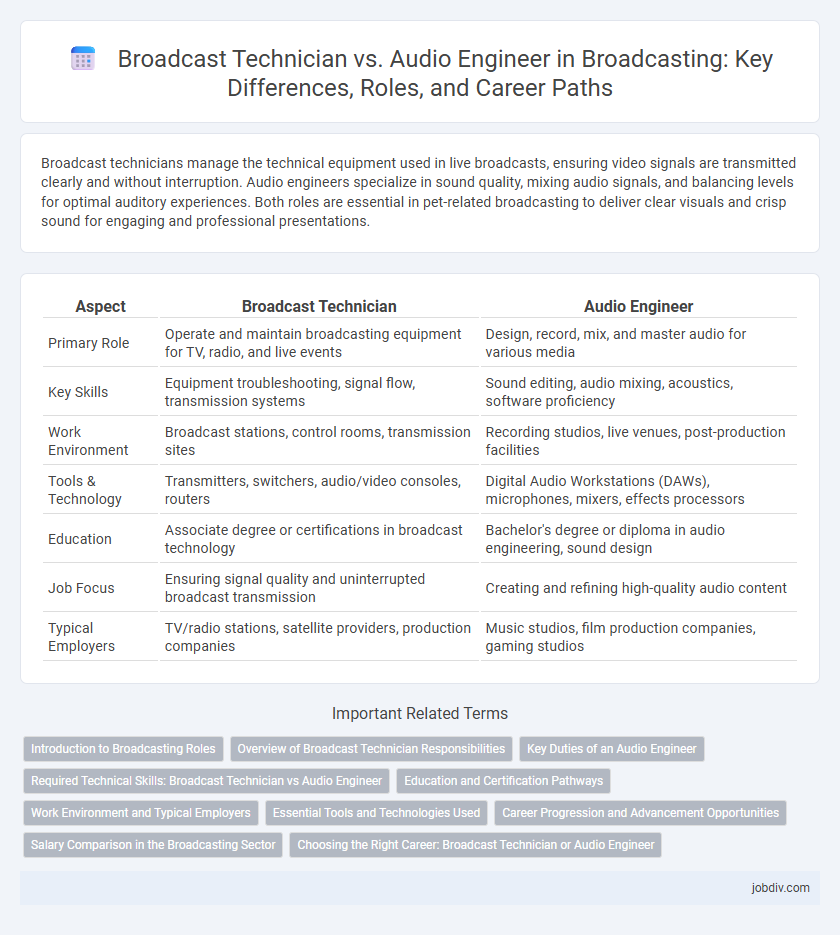Broadcast technicians manage the technical equipment used in live broadcasts, ensuring video signals are transmitted clearly and without interruption. Audio engineers specialize in sound quality, mixing audio signals, and balancing levels for optimal auditory experiences. Both roles are essential in pet-related broadcasting to deliver clear visuals and crisp sound for engaging and professional presentations.
Table of Comparison
| Aspect | Broadcast Technician | Audio Engineer |
|---|---|---|
| Primary Role | Operate and maintain broadcasting equipment for TV, radio, and live events | Design, record, mix, and master audio for various media |
| Key Skills | Equipment troubleshooting, signal flow, transmission systems | Sound editing, audio mixing, acoustics, software proficiency |
| Work Environment | Broadcast stations, control rooms, transmission sites | Recording studios, live venues, post-production facilities |
| Tools & Technology | Transmitters, switchers, audio/video consoles, routers | Digital Audio Workstations (DAWs), microphones, mixers, effects processors |
| Education | Associate degree or certifications in broadcast technology | Bachelor's degree or diploma in audio engineering, sound design |
| Job Focus | Ensuring signal quality and uninterrupted broadcast transmission | Creating and refining high-quality audio content |
| Typical Employers | TV/radio stations, satellite providers, production companies | Music studios, film production companies, gaming studios |
Introduction to Broadcasting Roles
Broadcast technicians manage and maintain the technical equipment used in television and radio production, ensuring signal quality and transmission integrity. Audio engineers specialize in capturing, mixing, and producing sound for broadcast programming, optimizing audio clarity and balance. Both roles are essential in delivering high-quality broadcasts, with technicians focusing on equipment functionality and engineers on sound aesthetics.
Overview of Broadcast Technician Responsibilities
Broadcast Technicians manage and maintain the equipment used for television and radio transmissions, ensuring smooth signal flow and compliance with broadcasting standards. Their responsibilities include setting up, operating, and troubleshooting audio and video gear, coordinating live broadcasts, and performing routine technical maintenance to prevent disruptions. Skilled in satellite, cable, and streaming technologies, they work closely with Audio Engineers, who specialize in sound mixing and audio quality control during production.
Key Duties of an Audio Engineer
Audio engineers specialize in operating and maintaining sound equipment, mixing audio tracks, and ensuring clear, high-quality sound during broadcasts. They adjust audio levels, troubleshoot technical issues, and collaborate with producers to achieve the desired sound effects and balance. Their expertise in acoustics and audio signal flow is critical for delivering seamless audio experiences in live and recorded broadcasting environments.
Required Technical Skills: Broadcast Technician vs Audio Engineer
Broadcast Technicians require proficiency in operating transmission equipment, signal flow management, and maintaining broadcast hardware to ensure seamless live or recorded broadcasts. Audio Engineers specialize in sound mixing, audio editing software, microphone placement, and sound quality optimization for various media productions. Both roles demand a strong understanding of digital audio systems, but Broadcast Technicians emphasize broadcast signal integrity while Audio Engineers focus on audio fidelity and creative sound design.
Education and Certification Pathways
Broadcast Technicians typically pursue an associate degree in electronics or broadcasting technology, with certifications such as the Society of Broadcast Engineers (SBE) Certified Broadcast Technologist enhancing job prospects. Audio Engineers often obtain a bachelor's degree in audio production, music technology, or sound engineering, coupled with certifications like the Audio Engineering Society (AES) Professional Certification to demonstrate expertise. Both careers benefit from hands-on training and industry-specific certifications, but Audio Engineers generally require more formal education in acoustics and audio equipment.
Work Environment and Typical Employers
Broadcast technicians typically work in television and radio stations, production companies, and live event venues, operating and maintaining broadcast equipment in fast-paced studio environments. Audio engineers are often employed by recording studios, concert halls, post-production houses, and media production companies, focusing on sound recording, mixing, and mastering in controlled studio settings. Both professions may also find employment with sports arenas, film production companies, and corporate multimedia departments.
Essential Tools and Technologies Used
Broadcast Technicians primarily rely on video switchers, broadcast consoles, and RF signal analyzers to ensure seamless transmission and signal integrity, while also using waveform monitors and satellite uplinks in live broadcasting environments. Audio Engineers utilize digital audio workstations (DAWs), mixing consoles, microphones, and audio processors such as equalizers, compressors, and noise gates to capture and manipulate sound quality for radio, television, and streaming services. Both roles require familiarity with broadcast automation software and industry-standard protocols like SDI and AES/EBU to synchronize audio and video streams effectively.
Career Progression and Advancement Opportunities
Broadcast Technicians typically advance by gaining expertise in signal transmission and equipment maintenance, progressing to roles like Master Control Operator or Broadcast Engineer. Audio Engineers enhance their skills in sound mixing, recording, and live production, leading to opportunities as Lead Sound Engineer or Audio Post-Production Supervisor. Both careers benefit from continuous technical training and certifications to stay competitive in the evolving broadcasting industry.
Salary Comparison in the Broadcasting Sector
Broadcast Technicians in the broadcasting sector earn an average salary ranging from $40,000 to $60,000 annually, depending on experience and location. Audio Engineers typically command higher salaries, with averages between $50,000 and $80,000 due to specialized skills in sound production and mixing. Salary disparities reflect differences in technical responsibilities and industry demand within the broadcasting field.
Choosing the Right Career: Broadcast Technician or Audio Engineer
Broadcast Technicians specialize in operating and maintaining equipment used for television and radio broadcasts, ensuring seamless signal transmission and technical quality. Audio Engineers focus on capturing, mixing, and mastering sound for various media, emphasizing creative audio production and acoustics. Choosing between these careers depends on your preference for technical equipment management or creative sound design within the broadcasting industry.
Broadcast Technician vs Audio Engineer Infographic

 jobdiv.com
jobdiv.com